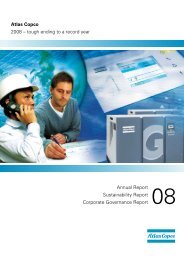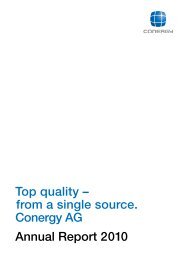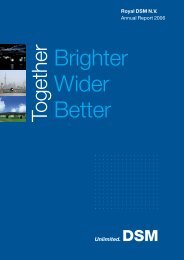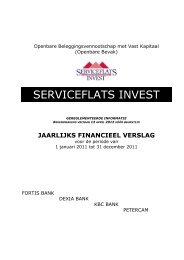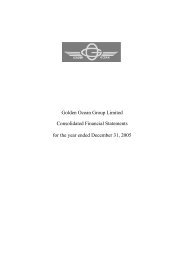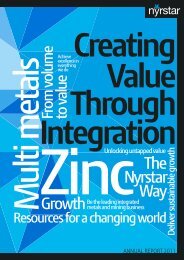Annual Report 2011 - Analist.be
Annual Report 2011 - Analist.be
Annual Report 2011 - Analist.be
Create successful ePaper yourself
Turn your PDF publications into a flip-book with our unique Google optimized e-Paper software.
All mem<strong>be</strong>rs of the Committee are non-executive Directors.Two mem<strong>be</strong>rs, including its chairman, are independent withinthe meaning of Article 526(b) of the Company Code. The twoare Jean-Louis Beffa and Antoinette d’Aspremont Lynden, whorepresent 50% of the Committee’s mem<strong>be</strong>rs. The 2009 Codeprovides that the majority of mem<strong>be</strong>rs of the Audit Committeemust <strong>be</strong> independent Directors. However, owing to GBL’sshareholding structure, the Charter allows a derogation fromthis provision and limit the num<strong>be</strong>r of independent Directors tohalf the Committee’s mem<strong>be</strong>rship.As stated in the biographies of mem<strong>be</strong>rs of the Board ofDirectors presented from page 126 to page 130 of this report,all mem<strong>be</strong>rs of the Committee have financial and/or accountingexpertise as a result of their education or experience.2.3.2. Frequency of meetings and deli<strong>be</strong>rationsThe Audit Committee met on four occasions in <strong>2011</strong> with anaverage attendance rate of 93.75%, calculated on the basisof the weighted attendance of all mem<strong>be</strong>rs during exerciseof their mandate. Committee mem<strong>be</strong>rs were either physicallypresent for meetings or participated by telephone. TheDirectors’ individual attendance rate at these meetings areshown in the table above.One mem<strong>be</strong>r of the Executive Management, the Company’sChief Financial Officer, as well as its Statutory Auditor,attended all the meetings.The Audit Committee assists the Board of Directors withits task of ensuring the true and fair presentation of GBL’saccounts and consolidated financial statements and withits auditing responsibilities in the broad sense of the term,in particular the quality of internal audits and of informationprovided to shareholders and markets.In <strong>2011</strong>, the main subjects addressed by the Committee wereas follows:• review of the Company’s annual and half-yearly consolidatedfinancial statements and consolidated quarterly results;• review of projections for the short and medium terms;• analysis of the financing situation and indebtness;• review of the book values of shareholdings, including therecording of an impairment on Lafarge;• review of risks and assessment of the effectiveness ofinternal control and risk management systems;• review of press releases, notably concerning the group’sfinancial statements and results;• review of texts to <strong>be</strong> published in the annual reportconcerning:- financial information;- comments on internal control and risk management;• review and follow-up of the independence of and servicesprovided by the Statutory Auditor, other than the tasksassigned by law (in particular the statutory auditing of theaccounts).• examination of the full consolidation of Imerys and of theensuing consequences on the presentation of the financialstatements;• follow-up of the main legal actions under way.2.4. Assessment of the functioning and performanceof the Board of Directors’ CommitteesIn terms of the evolution and effectiveness of their work, thedifferent Committees may, at any time, propose changes totheir respective rules of procedure. The Charter therefore doesnot establish a regular procedure for review of the Committees’rules of procedure. The functioning and performance of eachCommittee is measured and analysed as part of the triennialassessment of the performance of the Board of Directors. Partof the individual assessment questionnaire is reserved for thispurpose to mem<strong>be</strong>rs of the respective Committees.3. Remuneration <strong>Report</strong>3.1. Procedure for establishing remuneration policy and settingremuneration for mem<strong>be</strong>rs of the Board of DirectorsThe procedure for establishing remuneration policy andsetting remuneration for mem<strong>be</strong>rs of the Board is determinedby the Board of Directors on the basis of proposals from theNomination and Remuneration Committee.The fees paid to non-executive Directors are set by theBoard of Directors on a proposal from the Nomination andRemuneration Committee, within a ceiling submitted to theGeneral Meeting for approval. These fees, which had not <strong>be</strong>enreviewed since 2001, were <strong>be</strong>nchmarked and revised in <strong>2011</strong>.The nature and the amount of the remunerations, as well aspossible severance payments, for mem<strong>be</strong>rs of ExecutiveManagement are decided by the Board of Directors on aproposal from the Nomination and Remuneration Committee,which is assisted in its work by an outside consultant.Performance-based stock option plans are determined bythe Board of Directors on a proposal from the Nomination andRemuneration Committee.These plans must first <strong>be</strong> approved by the shareholders.Such approval covers the plan itself as well as its overallmaximum value, but not the individual grant of stock optionsunder the plan.Corporate governance statement<strong>Annual</strong> <strong>Report</strong> <strong>2011</strong> 137




